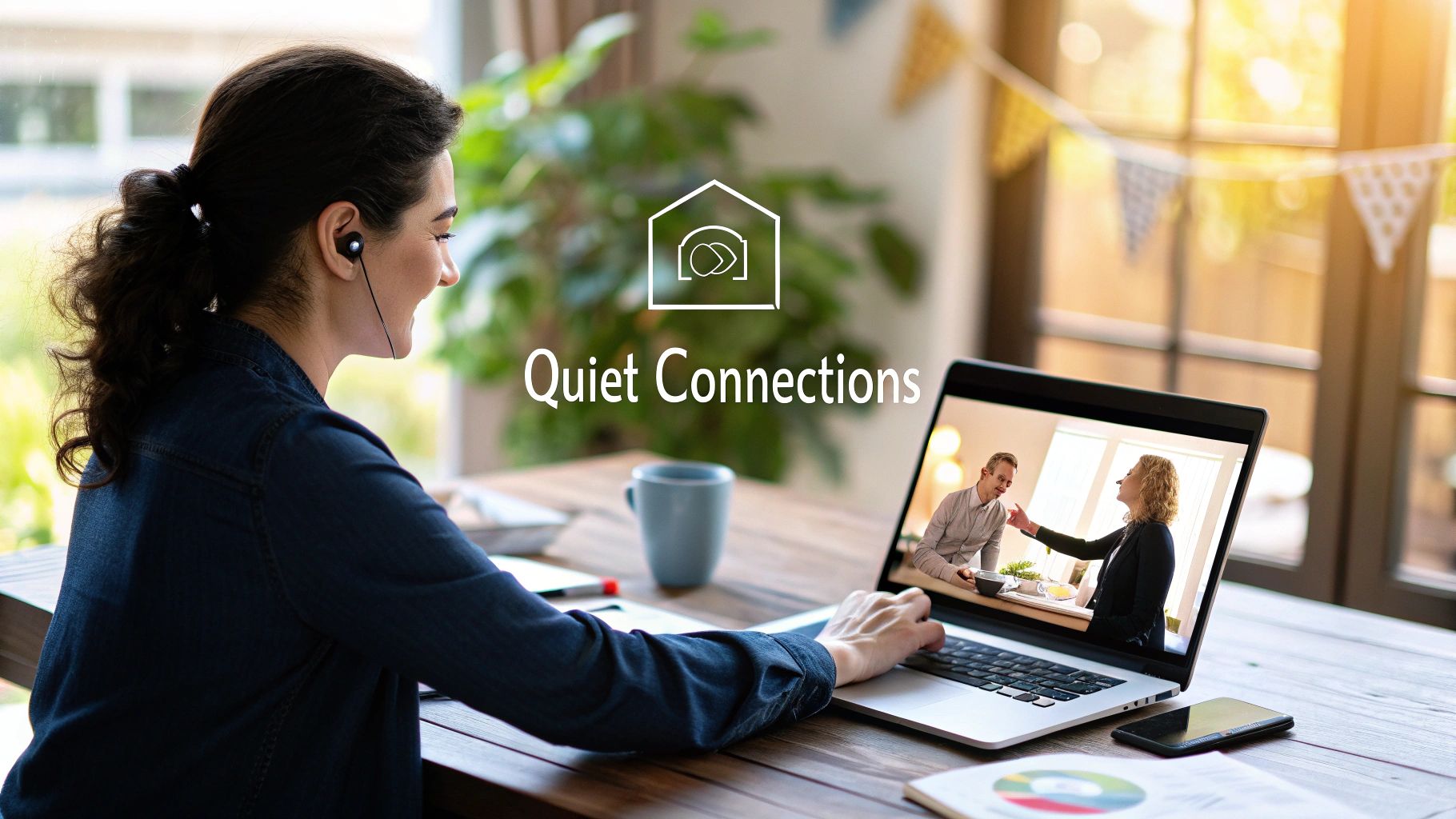
Top Networking Tips for Introverts to Build Connections
Published on 2025-06-08
Networking Doesn't Have to Be Scary (Even for Introverts)
Networking is essential for career advancement and business growth, but it can be challenging for introverts. This listicle offers six practical networking tips for introverts to connect authentically and effectively. Learn how to leverage one-on-one coffee meetings, online networking, strategic event preparation, the "connector" role, skill-based networking, and impactful written follow-up. These strategies will help you build valuable professional relationships without feeling overwhelmed.
1. One-on-One Coffee Meetings
For introverts, the thought of networking events can trigger a wave of anxiety. Large, bustling rooms filled with forced small talk often feel more draining than productive. Fortunately, there's a far more effective networking strategy tailored to introverted personalities: one-on-one coffee meetings. This personalized approach leverages introverts' natural strength in building deep, meaningful connections, allowing them to foster genuine professional relationships in a comfortable, low-pressure setting. Instead of trying to make a fleeting impression on dozens of people simultaneously, introverts can focus their energy on creating a lasting bond with one individual at a time. This method prioritizes quality over quantity, recognizing that a handful of strong connections can be far more valuable than a large network of superficial acquaintances.

One-on-one coffee meetings involve scheduling individual conversations with professionals in your field, often over a cup of coffee or a casual lunch. These meetings typically last between 30-60 minutes and follow a structured yet informal format. Unlike the chaotic nature of networking events, these intimate settings allow introverts to engage in focused, uninterrupted conversations, fostering genuine connection and understanding. This approach also allows for a more natural flow of conversation, encouraging deeper discussions about career paths, industry trends, and shared professional interests.
Successful implementation of this networking strategy can take many forms. Think of a LinkedIn user reaching out to someone they admire for an informational interview. Or envision two industry professionals meeting at a local coffee shop to discuss potential collaborations. Perhaps a recent graduate connects with an alumnus for career guidance, or an entrepreneur meets with a potential mentor to discuss their startup. All of these scenarios exemplify the power of one-on-one coffee meetings.
This approach offers several advantages specifically beneficial for introverts. It eliminates the overwhelming group dynamics of traditional networking events, allowing introverts to conserve energy and avoid feeling drained. The intimate setting makes it easier to build authentic relationships based on genuine shared interests. The structured format and pre-determined time limit also allow for more focused conversation and easier preparation, minimizing the anxiety often associated with impromptu networking interactions. Moreover, these focused interactions are generally more memorable for both parties involved, increasing the likelihood of a lasting professional connection.
However, this strategy isn't without its limitations. Scheduling individual meetings can be time-intensive and require more coordination than simply attending a large networking event. It can also limit the sheer number of new connections made in a given timeframe. And while the setting is less intimidating than a large group, the initial outreach can still feel challenging for some introverts.
To maximize the effectiveness of one-on-one coffee meetings, consider these practical tips: Prepare 3-5 thoughtful questions in advance to guide the conversation and demonstrate genuine interest. Choose quiet venues with minimal distractions to facilitate focused discussion. Clearly communicate the expected meeting duration upfront to respect everyone's time. Crucially, follow up within 48 hours with a personalized thank-you message, reinforcing the connection and expressing your appreciation for their insights. Finally, whenever possible, offer value or assistance to the other person, demonstrating your commitment to building a mutually beneficial relationship.
This approach, popularized by networking gurus like Keith Ferrazzi, author of Never Eat Alone, and emphasized in countless professional development courses, has become a cornerstone of successful networking for introverts. It recognizes that genuine connection, not quantity of contacts, is the key to building a thriving professional network. If you’re an introvert seeking a more effective and less draining way to expand your professional circle, embracing the power of one-on-one coffee meetings could be the key to unlocking your networking potential. They provide a comfortable and effective avenue for introverts to connect authentically, build strong relationships, and advance their careers, proving that networking doesn't have to be a daunting experience. This is precisely why one-on-one coffee meetings deserve a top spot on the list of networking tips for introverts.
2. Online Networking and Social Media Engagement
For introverts, the thought of traditional networking events can be draining. Fortunately, the digital age offers a powerful alternative: online networking and social media engagement. This digital-first approach allows introverts to build professional relationships through thoughtful online interactions, content sharing, and virtual conversations. It capitalizes on introverts' preference for written communication and provides ample time to craft well-considered responses, all while building a professional presence from the comfort of their own space. This method proves particularly effective for networking tips for introverts because it sidesteps the often-overwhelming aspects of in-person events.

This approach leverages asynchronous communication, meaning you don't need to respond immediately. This "think-before-you-speak" environment is ideal for introverts, allowing them to formulate insightful contributions. The written format plays to the strengths of many introverts, who often excel at expressing themselves clearly and concisely in writing. Furthermore, online networking transcends geographical limitations, providing a global reach and access to a vast network of professionals. You also have the ability to research connections before engaging, allowing introverts to approach interactions with confidence and tailor their communication effectively. Multiple platforms cater to different networking styles, from LinkedIn for professional connections to niche forums for specialized interests.
Several key benefits make online networking a particularly strong strategy for introverts. It eliminates the energy drain often associated with in-person interactions, allowing for more sustained engagement. The asynchronous nature provides ample time to craft thoughtful, well-considered responses, leading to more meaningful connections. It's also significantly easier to maintain a consistent professional presence online, reinforcing your brand and expertise. The lower barrier to initial contact makes it less intimidating to reach out to new people. Finally, you can network during your preferred hours, aligning with your natural energy rhythms.
However, online networking is not without its drawbacks. It may lack the warmth and spontaneity of face-to-face interaction, making it harder to build deep rapport quickly. It requires consistent content creation and engagement to remain visible and relevant. The sheer volume of digital noise can make it challenging to stand out from the crowd. Finally, there's a risk of misunderstanding without nonverbal cues, highlighting the importance of clear and precise communication.
Consider these examples of successful online networking for introverts: thought leadership posts and meaningful comments on LinkedIn, engaging in industry conversations and hashtag participation on Twitter, contributing to professional Discord or Slack communities, participating in industry-specific forums, and leveraging virtual networking events and webinar Q&A sessions. These platforms offer diverse avenues to connect with like-minded professionals and share your expertise.
To maximize your online networking success, follow these actionable tips: share industry insights and thoughtful commentary to establish yourself as a valuable contributor. Engage authentically with others' content before promoting your own, demonstrating genuine interest and building rapport. Use scheduling tools to maintain a consistent presence without feeling overwhelmed. Join niche professional groups aligned with your interests to connect with a targeted audience. Finally, when appropriate, transition online relationships to video calls to add a personal touch and deepen connections. Influencers like Gary Vaynerchuk have championed social media networking, and numerous LinkedIn influencers and thought leaders demonstrate its effectiveness. Remote work communities and digital nomad networks also rely heavily on online networking to build and maintain professional relationships.
When should you use this approach? If you’re an introvert seeking a less daunting and more controlled networking environment, online engagement is ideal. It's especially useful for building connections outside your immediate geographical area and establishing thought leadership within your industry. Learn more about Online Networking and Social Media Engagement to further enhance your strategy and connect with a wider audience. This approach empowers introverts to leverage their strengths and build meaningful professional relationships in a way that feels authentic and comfortable.
3. Strategic Event Preparation and Arrival Timing
For introverts, networking events can feel like navigating a social minefield. The constant buzz of conversation, the pressure to make small talk, and the sheer volume of people can be overwhelming. That's why strategic event preparation and arrival timing is a crucial networking tip for introverts. This methodical approach involves thorough pre-event research, planning your arrival time strategically, and preparing conversation starters. This allows introverts to maximize their limited social energy by being purposeful about when and how they engage, often arriving early when crowds are smaller and their own energy levels are higher. Instead of feeling drained and overwhelmed, you can approach networking with a sense of purpose and control.

This strategy rests on several key features: pre-event research of attendees and speakers, choosing the optimal arrival time (often early), preparing conversation topics and questions, planning how you'll manage your energy throughout the event, and having clear objectives and exit strategies. By front-loading the effort, you conserve your precious social energy for the event itself. This proactive approach transforms networking from a dreaded obligation into a manageable and even enjoyable experience.
For instance, imagine an industry conference. Instead of showing up just as the keynote speaker begins, arrive 15-30 minutes early. The room will be less crowded, allowing you to acclimate to the environment and initiate conversations more easily. Before the event, research the speakers' backgrounds and prepare 3-4 conversation starters related to the event's theme. Perhaps you've read an article by one of the speakers and can mention it as a conversation opener. This preparation allows you to engage in more meaningful discussions rather than resorting to generic small talk. Setting a goal to have 2-3 quality conversations per event, rather than trying to meet everyone, can also help manage expectations and prevent overwhelm. Finally, schedule breaks between sessions for energy recovery, ensuring you don't burn out before the event concludes.
The benefits of this approach are numerous. It significantly reduces anxiety by giving you a sense of control. By maximizing your limited social energy, you can engage more effectively in the conversations you do have. This leads to more meaningful connections and fosters genuine relationships. The structure this strategy provides builds confidence, and the pre-event research enables you to target specific individuals or companies you're interested in connecting with.
However, this approach also has its drawbacks. It requires significant preparation time, which can be challenging for busy professionals. You might miss spontaneous opportunities that arise later in the event, and adhering too rigidly to a plan can sometimes feel scripted or unnatural. Finally, an early departure, driven by the need to conserve energy, might mean missing key moments or networking opportunities that occur later.
To effectively utilize this strategy, here are some actionable tips: review the attendee list and identify 3-5 people you'd like to meet. Prepare open-ended questions about industry trends or the speaker's topics to facilitate engaging conversations. Plan your outfit and logistics the night before to reduce stress on the day of the event. Set realistic goals for the number of new connections you aim to make, and have an exit strategy in place for when your energy levels start to drop. This might involve stepping outside for fresh air or simply excusing yourself politely.
This approach to networking, popularized by authors like Susan Cain and advocated by professional networking consultants and career coaches specializing in introversion, recognizes that introverts thrive in more focused, intentional interactions. By embracing strategic preparation and arrival timing, introverts can transform networking events from draining obligations into opportunities for meaningful connection and professional growth. This method deserves its place on this list because it provides introverts with the tools and strategies they need to successfully navigate the often-challenging world of networking, empowering them to build valuable relationships on their own terms.
4. The 'Connector' or Helper Role Strategy
Networking can feel like a daunting task, especially for introverts. The constant pressure to self-promote and make a strong impression can be draining and inauthentic. Fortunately, there's a networking strategy perfectly suited to introverted strengths: the 'Connector' or Helper Role Strategy. This approach allows introverts to leverage their natural listening and observational skills to build a strong network without the anxiety of constant self-promotion. Instead of focusing on broadcasting their own achievements, connectors focus on facilitating valuable connections between others, creating goodwill and building a reputation as a trusted resource within their network.

This strategy works by shifting the focus from self to others. Introverts often excel at observing the needs and interests of those around them. By actively listening and identifying potential synergies between their contacts, they can make introductions that benefit both parties. This creates a sense of reciprocity and builds genuine connections, fostering a supportive network built on mutual benefit. It's about being a facilitator, a resource, and a valuable member of the community, rather than the loudest voice in the room.
This approach deserves a place on this list because it transforms the often-dreaded act of networking into a genuine act of service. For introverts who find traditional networking exhausting or inauthentic, the Connector role provides a comfortable and effective alternative. Its features include prioritizing helping others over self-promotion, utilizing innate listening and observation skills, creating value through strategic introductions and connections, building a strong reputation as a trusted network facilitator, and, importantly, reducing the pressure of constantly talking about oneself.
Examples of the Connector Role in Action:
- Connecting Professionals: Imagine you meet a marketing consultant at a conference who mentions needing help with web development. You recall a web developer in your network looking for new clients. Introducing these two professionals could be mutually beneficial.
- Sharing Opportunities: You see a job posting that perfectly aligns with a contact's skills and career aspirations. Sharing this opportunity demonstrates your genuine interest in their success.
- Offering Expertise: A colleague is struggling with a particular software program. If you have expertise in that area, offering assistance can strengthen your connection and build goodwill.
- Organizing Events: Volunteering to organize a professional meetup or industry event provides a natural platform for connecting with others and facilitating introductions.
- Creating Value-Driven Content: Sharing insightful articles, templates, or other resources relevant to your industry helps establish you as a valuable resource and connector within your network.
Tips for Mastering the Connector Role:
- Detailed Note-Taking: Keep meticulous notes about your contacts, including their interests, needs, and goals. This information will be invaluable when identifying potential connection opportunities.
- Identify Synergies: Actively look for natural connections between your contacts. Think about how you can introduce people who could benefit from knowing each other.
- Offer Specific Help: Instead of vague offers of assistance, offer concrete and specific help. For instance, instead of saying "Let me know if I can help," offer to connect them with a specific resource or introduce them to a relevant contact.
- Follow Up: After making an introduction, follow up with both parties to ensure the connection was valuable. This demonstrates your commitment to facilitating meaningful connections.
- Don't Forget Yourself: While the focus is on helping others, don’t completely shy away from mentioning your own projects or needs when relevant. It’s about balance, not self-erasure.
Pros and Cons of the Connector Strategy:
Pros:
- Feels more natural and less self-promotional.
- Creates genuine goodwill and reciprocity.
- Leverages introverts' natural helping tendencies.
- Builds strong reputation as a valuable connector.
- Reduces networking anxiety by focusing outward.
Cons:
- May not adequately promote own achievements.
- Requires broad network knowledge to be effective.
- Can be time-consuming to maintain connections.
- May not receive direct credit for contributions.
This strategy has been popularized by thought leaders like Adam Grant, author of "Give and Take," and Reid Hoffman, LinkedIn founder, whose networking philosophy emphasizes the power of helping others. It's also a common approach employed by successful professional association leaders and community builders. By embracing the Connector role, introverts can transform networking from a source of anxiety into a powerful tool for building authentic and mutually beneficial relationships.
5. Skill-Based or Educational Networking
For introverts, the thought of traditional networking events can feel daunting. The pressure to make small talk, forge instant connections, and "work the room" often clashes with their preference for deeper, more meaningful interactions. Fortunately, there's a powerful alternative: skill-based or educational networking. This approach leverages an introvert's natural strengths, turning learning, teaching, and knowledge-sharing into powerful networking opportunities. This strategy is a particularly effective networking tip for introverts because it shifts the focus from superficial interactions to genuine engagement based on shared interests and expertise.
Skill-based networking centers around the exchange of knowledge and skills. Instead of attending cocktail parties or networking mixers, introverts using this strategy engage in activities where learning and teaching take center stage. This could include attending workshops, leading training sessions, presenting at conferences, participating in webinars, mentoring junior professionals, or even contributing to industry publications or blogs. Essentially, any environment that facilitates the sharing of expertise can become a networking hub.
Think of it this way: your knowledge and skills become your networking currency. Instead of exchanging business cards and superficial pleasantries, you're exchanging valuable insights and expertise. This creates a much more natural and comfortable environment for introverts to connect with others. Because the focus is on the subject matter, the pressure to perform socially diminishes significantly. Conversations flow organically from shared interests, making the entire networking experience feel purposeful and less transactional.
The benefits of this approach are numerous. For introverts who often possess deep subject matter knowledge, skill-based networking provides a platform to showcase their expertise and establish credibility within their field. Teaching or presenting on a specific topic naturally positions you as a thought leader and opens doors to connect with other professionals who share similar interests. This type of networking feels meaningful because it’s driven by a genuine desire to learn, teach, and contribute to the field, resonating deeply with introverts' values. It leverages introverts' natural inclination for in-depth exploration and thoughtful engagement.
For example, an introvert specializing in data analysis could present their research findings at an industry conference, leading to connections with other data scientists and potential employers. A software engineer proficient in a specific programming language could teach a workshop, building a network of like-minded professionals and showcasing their expertise. Participating in professional development book clubs, mentoring junior colleagues in specific skills, or contributing articles to industry publications are all excellent examples of how introverts can leverage their expertise for networking purposes. These activities offer a less intimidating environment for introverts to network organically while deepening their knowledge. Think of the impact Brené Brown has made by sharing her research through speaking engagements and books, effectively networking and building a strong following based on her expertise. Similarly, many TED Talk speakers have cultivated extensive networks by sharing their knowledge and insights on a global stage.
However, skill-based networking isn’t without its challenges. It can require significant time investment to prepare presentations, develop training materials, or stay current with industry trends. It might also limit your networking scope to individuals within your specific area of expertise. And while it’s an effective strategy, it may not address all networking needs, such as exploring opportunities in unrelated fields.
Here are some practical tips to get started with skill-based networking:
- Identify your unique areas of expertise: What are you truly knowledgeable and passionate about? What skills can you confidently share with others?
- Start small: Begin with smaller speaking opportunities or workshops to build confidence. Consider contributing to online forums or joining local meetups related to your field.
- Create valuable content: Develop educational resources like blog posts, articles, or online presentations that showcase your expertise.
- Seek out learning opportunities: Attend workshops and conferences in areas where you want to expand your knowledge and network with other learners.
- Join professional associations: Become a member of organizations related to your specialties to connect with other professionals and access educational resources.
By embracing skill-based networking, introverts can transform their natural strengths into powerful networking tools. This approach allows them to connect with others in a meaningful way, build credibility, and advance their careers, all while staying true to their introverted nature. This makes it an invaluable networking tip for introverts seeking to build authentic and valuable professional connections.
6. Written Communication Follow-Up Excellence
Networking can feel like a draining obligation for many introverts. The small talk, the forced interactions, the pressure to "work the room"—it can all be quite overwhelming. But what if you could leverage your natural strengths to build authentic and valuable professional connections? That's where written communication follow-up excellence comes in. This networking strategy plays to many introverts' strengths in crafting thoughtful, well-considered messages, allowing them to cultivate professional relationships in a way that feels comfortable and effective. This approach is particularly helpful for LinkedIn content creators, social media managers, marketing professionals, entrepreneurs, small business owners, founders, and CEOs who understand the value of building a strong professional network. It allows them to connect with potential clients, partners, and collaborators in a more personalized and meaningful way, even if in-person networking feels daunting.
Written communication follow-up excellence is all about making a lasting impression after the initial interaction. Whether it's a quick chat at a conference, a virtual meeting, or even a brief email exchange, the key is to follow up promptly and thoughtfully in writing. This could involve sending a personalized thank-you email, sharing a relevant article, or simply checking in to see how things are going. By focusing on high-quality written communication, introverts can build rapport and nurture relationships over time, all while staying within their comfort zone.
Here are some examples of how this method works in practice:
- Detailed thank-you emails after coffee meetings: Instead of a generic "nice to meet you," recap specific points of conversation and suggest concrete next steps, like scheduling a follow-up call or sharing a relevant resource. For example, "It was great learning more about your work on Project X during our coffee meeting today. I was especially interested in your approach to Y. I've attached an article that discusses Z, which I thought you might find insightful. Would you be open to connecting again next week to discuss further?"
- Quarterly check-in messages with relevant industry articles: Maintain top-of-mind awareness by periodically reaching out with valuable content tailored to their interests. "I came across this article on the latest trends in [industry] and immediately thought of you and our conversation about [topic]. Hope you find it interesting!"
- Personalized LinkedIn connection requests: Go beyond the standard "I'd like to add you to my professional network." Instead, mention something specific that sparked your interest in connecting. "I enjoyed reading your recent post on [topic]. I'm also working in the [industry] space and would love to connect."
- Handwritten thank-you notes after significant meetings: In a digital world, a handwritten note stands out and demonstrates genuine appreciation. This adds a personal touch that can be particularly impactful after an important meeting or introduction.
- Email newsletters sharing industry insights with your network: Position yourself as a valuable resource by curating and sharing relevant content. This can also spark further conversation and engagement.
So, when and why should you use this approach? Written follow-up is beneficial anytime you want to strengthen a professional connection, particularly if you're an introvert who prefers to communicate in writing. It allows you to:
Pros:
- Play to your writing strengths: Introverts often excel at written communication, allowing them to carefully craft nuanced and thoughtful messages.
- Craft well-considered messages: The asynchronous nature of written communication allows introverts the time they need to think through their responses and avoid the pressure of on-the-spot conversation.
- Create a lasting written record of interactions: This helps keep track of conversations and build a history with your contacts.
- Demonstrate professionalism and attention to detail: A well-written follow-up shows that you value the connection and are invested in building a relationship.
- Work on your preferred schedule: You can dedicate focused time to crafting messages when you're most productive.
Cons:
- May not replace all verbal communication: Some situations may still require phone calls or video meetings.
- Can be time-intensive: Personalizing each message requires effort and thoughtfulness.
- Risk of overthinking: Introverts can sometimes get caught up in perfecting their messages, leading to delays or inaction.
- Not suitable for all recipients: Some people may prefer more immediate or verbal forms of communication.
Tips for Success:
- Send follow-up messages within 24-48 hours of meeting.
- Reference specific details from your conversation.
- Include relevant resources or articles that might interest them.
- Set calendar reminders for periodic check-ins.
- Keep messages concise but personal and valuable.
Experts like Ann Handley, a renowned content marketing and written communication expert, along with numerous professional etiquette consultants and executive coaches specializing in relationship building, have popularized the importance of thoughtful written communication in professional settings. Learn more about Written Communication Follow-Up Excellence.
By mastering the art of written follow-up, introverts can leverage their natural strengths to build a thriving professional network, all while staying true to themselves. This approach enables genuine connections and strengthens relationships in a way that feels authentic and sustainable, proving that networking doesn't have to be a dreaded chore, but rather a rewarding opportunity for professional growth.
6 Introvert Networking Tips Compared
| Tip Title | Implementation Complexity 🔄 | Resource Requirements ⚡ | Expected Outcomes 📊 | Ideal Use Cases 💡 | Key Advantages ⭐ |
|---|---|---|---|---|---|
| One-on-One Coffee Meetings | Medium - Requires scheduling and preparation | Moderate - Time for meetings and coordination | High-quality, authentic connections with fewer contacts | Introverts preferring deep, meaningful conversations in low-pressure settings | Builds genuine relationships; energy-efficient for introverts |
| Online Networking and Social Media Engagement | Low to Medium - Requires consistent effort over time | Low - Primarily digital tools and time | Broad reach and sustained professional presence | Introverts comfortable with written communication and flexible timing | Global reach; asynchronous communication advantages |
| Strategic Event Preparation and Arrival Timing | High - Requires thorough prep and strategic planning | Moderate to High - Time for research and event attendance | Purposeful, energy-managed engagement with targeted connections | Networking events where introverts want to maximize social energy | Reduces anxiety; maximizes limited social energy |
| The 'Connector' or Helper Role Strategy | Medium - Needs relationship knowledge and follow-up | Moderate - Maintaining contacts and connection effort | Strong reputation as a valuable network facilitator | Networking situations where self-promotion is uncomfortable | Feels natural; builds goodwill and reciprocity |
| Skill-Based or Educational Networking | Medium to High - Preparation of content and skills | Moderate to High - Time investment in expertise and presentations | Credibility and meaningful relationships built on shared knowledge | Professional development and industry expertise sharing | Establishes authority; purposeful networking |
| Written Communication Follow-Up Excellence | Low to Medium - Requires writing skill and consistency | Low - Time for crafting personalized messages | Sustained, professional relationships maintained over time | After initial meetings to reinforce connection | Leverages introverts' writing strengths; creates lasting impressions |
Ready to Network Like a Pro?
Networking tips for introverts often focus on leveraging strengths like thoughtful engagement and active listening. We've covered six powerful strategies in this article, from one-on-one coffee chats and strategic online networking to utilizing the "connector" role and mastering the art of the follow-up. Remember, the key takeaway for introverts is to choose networking methods that feel authentic and allow you to build genuine connections, rather than trying to force yourself into situations that drain your energy. Mastering these approaches is invaluable for career advancement, business growth, and building a supportive professional community. By focusing on quality interactions over quantity, you can make networking a powerful tool for achieving your goals.
As an introvert, crafting compelling content for online networking can be a game-changer. Amplify your networking efforts and build a strong online presence with autoghostwriter. Check out autoghostwriter to automate your LinkedIn content creation and free up more time for meaningful connections. Choose a plan that suits your needs and start generating leads today!